Why Do Pigeons Peck Each Other?
Even though pigeons are considered to be peaceful animals, they can often engage in aggressive behaviors. And one prime example of them displaying aggression is pecking. But is that actually the case? If not, why do pigeons peck each other?
Pigeons can start peaking each other to protect their territory, nesting site, and offspring. Pecking can also be a form of displaying affection, which will not be aggressive.
So, how do you understand when the pigeon is pecking to assert dominance or display affection? You will find all the info related to pigeons pecking each other below!
Want to learn more about pigeon behavior:
Is Pecking Between Pigeons a Sign of Aggression?
As discussed earlier, pigeons pecking each other can be a sign of aggression. These birds can resort to pecking to assert dominance and establish a territory. And in case you didn’t know, pigeons are highly territorial.
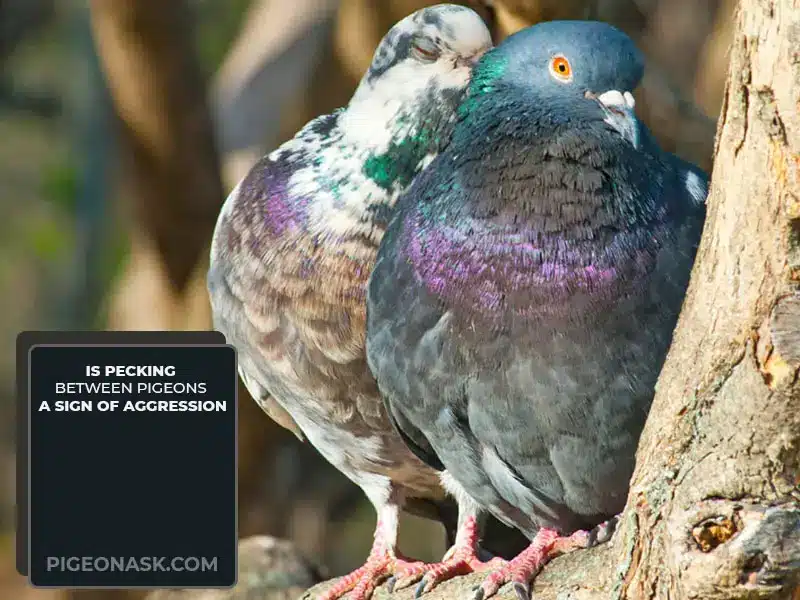
They will do anything and everything to protect their nesting site, from pecking to fighting with each other. Sometimes, pigeons chase and peck the other bird to drive the intruder off.
Likewise, pigeons competing for resources and food can resort to pecking. This, again, is a sign of aggression through which they will try to drive each other off. However, this only happens when there is a need for more food and resource in the area.
See our in-depth “Pigeon Behavior” article to learn what these urban birds eat. We cover their dietary habits and nutrition.
Why Do Pigeons Peck Each Other’s Beaks?
Pigeons can softly peck each other on their beaks. It is a form of communication for the birds. Through this behavior, the birds often strengthen the bond between themselves. And during the courtship ritual, this pecking can be called a kiss.
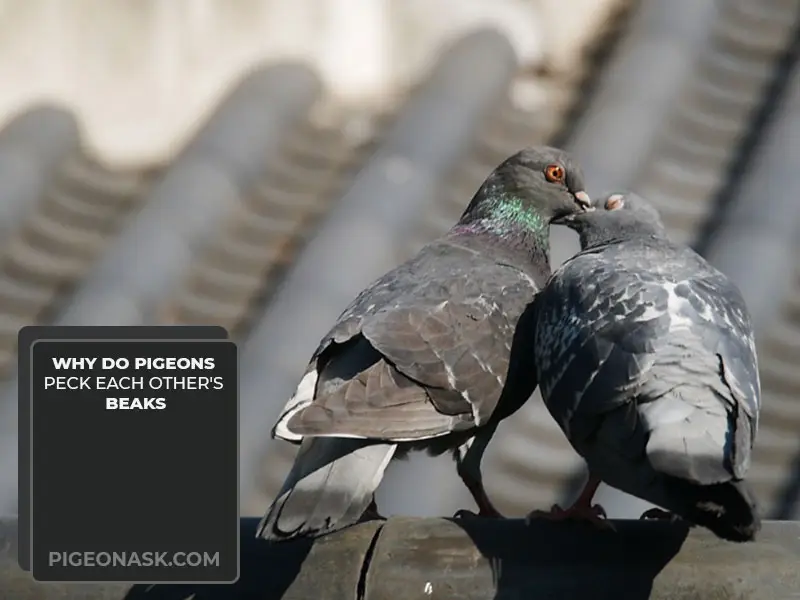
Yes, pigeons do kiss each other. But that generally happens during the courtship act. In this case, the male pigeon brings slightly digested food to the female. If the female is interested, she opens her beak and accepts the food.
This kiss can also start or end with soft pecking on the beaks. Again, these peckings are not aggressive. It establishes the bond between the pigeons and makes them start their journey together.
Why Do Pigeons Peck Each Others Neck?
Male pigeons can start to peck the neck of the female birds. This pecking happens when the female bird gets close to other males. That is, it is a sign of jealousy for the male pigeons.
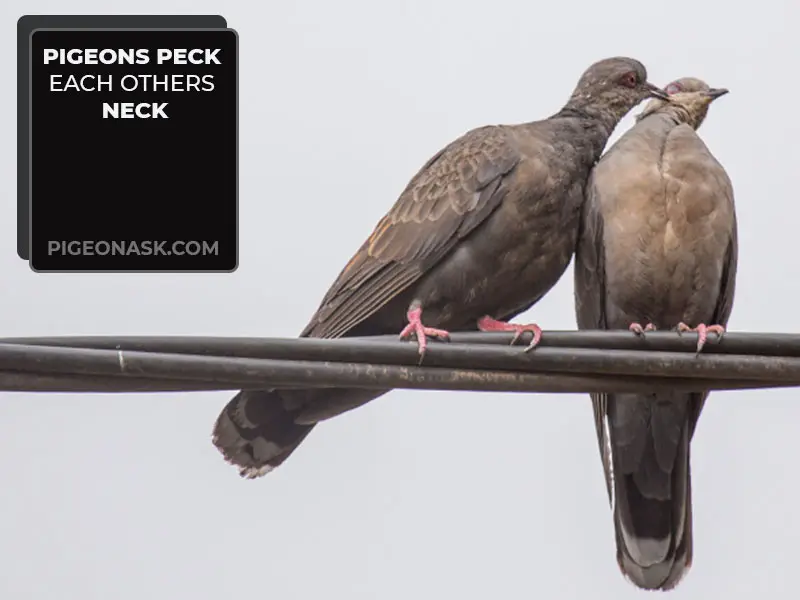
On that note, this pecking is generally not aggressive or violent. However, sometimes, it can surely take a violent form. For example, when the female bird moves closer to other males, her mate can aggressively peck her neck.
Sometimes, this pecking and controlling the movements of the female will continue until the bird lays eggs. Once the females lay eggs, both parents remain busy protecting and caring for their upcoming squabs.
What Triggers Pigeons to Peck Each Other?
Several factors can trigger a pigeon to peck at each other. Let’s put all things together to better understand the behavior.
Stress and Fear
Like other animals, pigeons can experience different things. And as a response to stress and fear, the pigeons can start peaking at each other. For example, they can warn each other by pecking when danger is nearby.
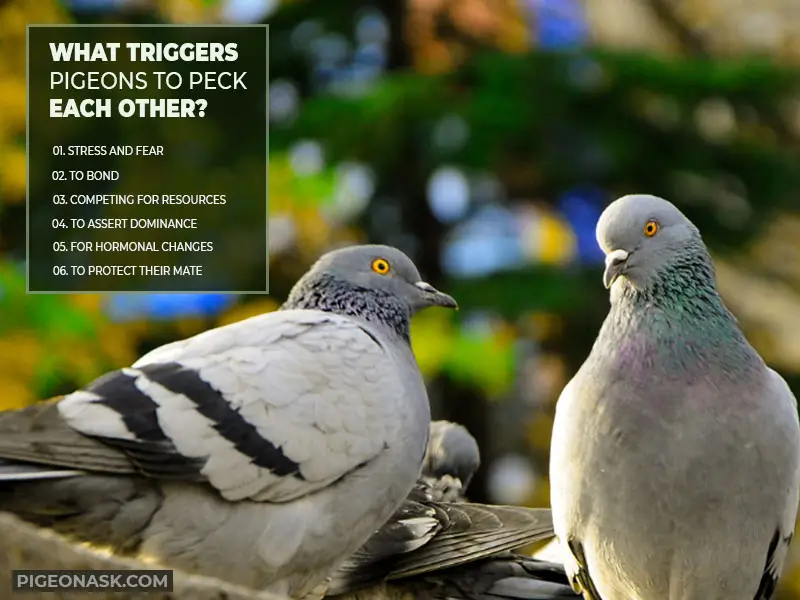
To Bond
Courtship usually ends with the pigeons pecking or kissing others on the beaks. This behavior is not aggressive. Instead, it is a form of displaying affection.
Competing for Resources
In some areas where resources and food are scarce, pigeons need to compete with each other. And to drive the other bird away from food; for example, pigeons can peck on the necks.
To Assert Dominance
Pigeons do not like it when other birds come to their claimed territory. To drive these intruders off, they will generally coo loudly first. If that fails the warn the other birds, pigeons will chase and peck them to drive them away.
For Hormonal Changes
During the breeding season, both males and females experience increased hormonal production. This can eventually make them aggressive toward each other. And thus, they can peck each other.
To Protect their Mate
Males can peck the female birds when they are nearby other male birds. This can be thought of as a form of jealousy. But it can surely keep their mate away from other males.
How Often Do Pigeons Peck Each Other?
The frequency of pigeons pecking each other will depend on the birds’ context and behavior. For example, when pigeons live in areas with limited resources, they often peck to compete with each other.
Likewise, during the mating season, males and females can frequently peck at each other. However, the pecking will be less frequent if everything is okay. In fact, you might not even see them pecking at all.
What to Do When Your Pigeons Are Pecking Each Other?
You must understand the context and take necessary actions if you see your pigeons pecking each other. But what do you need to do exactly? Here are a few suggestions:
Provide Adequate Food and Water
As you know, when food and resources are limited, pigeons will start to peck at each other. So, if you find the food bowl empty most of the time, provide the birds with adequate food.
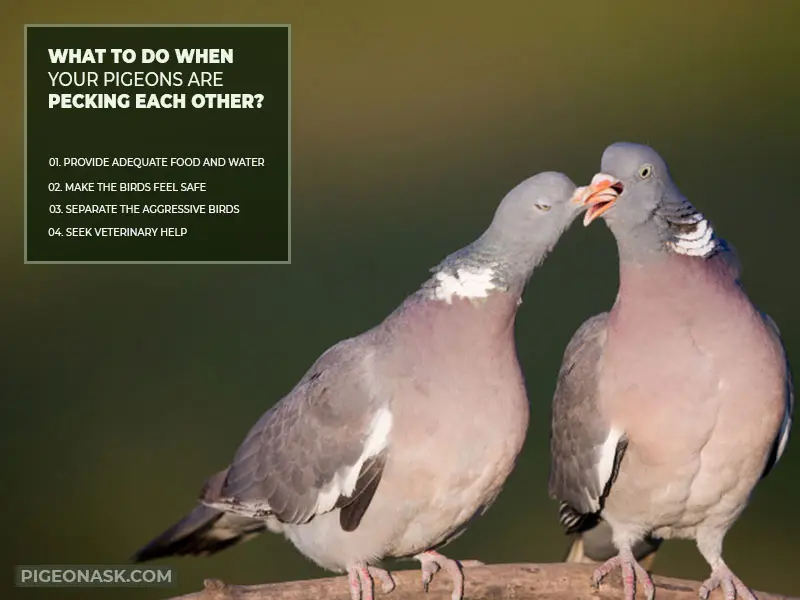
Make the Birds Feel Safe
Birds can peck each other when they sense danger or are stressed. Provide them with enough attention to make them feel safe. That can eventually cause the pigeons to stop pecking each other.
Separate the Aggressive Birds
Some pigeons are aggressive by nature. They will peck and show aggressive behaviors without any reason. For those, the best remedy would be separation. That is, keep the aggressive bird away from the rest.
Seek Veterinary Help
Can’t understand why your pigeons are being aggressive towards each other? Tried the solutions above, but the pecking is not stopping? In such a scenario, you should consult with a veterinarian. The professional will be able to come up with a solution.
Final Words
To recapitulate, pigeons pecking each other can be an act of displaying affection or being aggressive towards each other. So, to truly understand why pigeons peck each other, you need to dig into the context and their behavior.
With that said, we hope that you got all the answers that you were looking to get regarding the topic. And if you want to stay updated with our latest posts, please connect with us through our socials: Facebook, Twitter, and Pinterest.
Image Credit:
- Canva.com/photos
